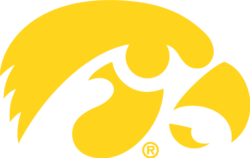By DARREN MILLER
hawkeyesports.com
IOWA CITY, Iowa — Luke Slavens celebrated his 20th birthday on Jan. 21 like most college sophomores.
The University of Iowa men’s basketball manager went to guard CJ Fredrick’s apartment and watched basketball games with forward Jack Nunge and other managers. All things considered, it was somewhat of a subdued celebration. Especially considering that nine days earlier, Slavens nearly died.
 In fact, he would have, if not for a quick response from Brad Floy, athletic trainer for men’s basketball, and several first responders who were already at Carver-Hawkeye Arena for the Indiana-Iowa women’s basketball game later that day.
In fact, he would have, if not for a quick response from Brad Floy, athletic trainer for men’s basketball, and several first responders who were already at Carver-Hawkeye Arena for the Indiana-Iowa women’s basketball game later that day.
Here’s what happened in the early afternoon of Sunday, Jan. 12:
The Hawkeye men’s basketball team was nearly done with a shooting drill in the practice gym on the second floor of Carver-Hawkeye Arena. Slavens was under a basket, rebounding for Joe Wieskamp, Joe Toussaint, and Patrick McCaffery. The three Hawkeyes weren’t missing many shots, so Slavens was essentially planted under the hoop.
Then Slavens experienced a dizzy spell. Wieskamp told him to sit in a chair; moments later, Toussaint asked Floy to check on the manager.
“He was feeling light-headed and dizzy,” Floy said. “In the middle of a question, he stopped answering and looked like he was going to faint. He was pale.”
Floy and student athletic trainer Zoe Hicks slid Slavens to the court and monitored his pulse and breathing.
The breathing stopped.
Quickly, an emergency action plan was executed. The Hicks called 9-1-1, Floy grabbed an Automated External Defibrillator (AED), which is always near at practice and games, strength and conditioning coach Bill Maxwell informed athletic trainer Jennie Sertterh, who was getting ready for the women’s game, and coaches cleared the practice gym.
After applying the AED pads, the message said, “shock advised.” It was delivered. Then Floy began chest compressions while a public safety officer supplied rescue breaths.
Meanwhile, Slavens was in a dream-like state, thinking he was riding in the back seat of his family’s car. When he arrived home in the dream, his father told him to wake.

%20--%3e%3csvg%20xmlns:inkpad='http://taptrix.com/inkpad/svg_extensions'%20height='231pt'%20xmlns:xlink='http://www.w3.org/1999/xlink'%20xmlns='http://www.w3.org/2000/svg'%20width='796pt'%20version='1.1'%20viewBox='0,0,796,231'%3e%3cdefs/%3e%3cg%20id='Untitled'%20inkpad:layerName='Untitled'%3e%3cpath%20d='M102.252+48.3067L83.5399+48.3067L83.5399+182.202L102.252+182.202L102.252+230.822L-0.0490809+230.822L-0.0490809+182.202L18.6626+182.202L18.6626+48.3067L-0.0490809+48.3067L-0.0490809+0.300613L102.252+0.300613L102.252+48.3067ZM239.828+230.822L165.748+230.822C138.908+230.822+121.27+213.184+121.27+184.35L121.27+46.773C121.27+18.092+139.215+0.300602+165.748+0.300602L239.828+0.300602C266.669+0.300602+284.307+18.2454+284.307+46.773L284.307+184.35C284.307+213.031+266.362+230.822+239.828+230.822ZM218.816+182.356L218.816+48.4601L186.607+48.4601L186.607+182.356L218.816+182.356ZM313.448+48.3067L297.037+48.3067L297.037+0.300613L394.123+0.300613L394.123+48.6135L375.718+48.6135L392.282+159.503L426.945+0.300613L476.025+0.300613L512.834+159.503L526.178+48.6135L509.307+48.6135L509.307+0.300613L605.166+0.300613L605.166+48.6135L589.368+48.6135L560.534+231.129L482.313+231.129L451.945+95.0859L420.963+230.822L345.81+230.822L313.448+48.3067ZM588.141+182.356L605.779+182.356L640.902+0.300613L745.656+0.300613L780.166+182.356L796.577+182.356L796.577+230.975L718.356+230.975L710.994+174.687L672.19+174.687L665.288+230.975L588.601+230.975L588.141+182.356L588.141+182.356ZM706.853+132.509L691.975+39.4111L676.638+132.509L706.853+132.509Z'%20opacity='1'%20fill='%23ffcd00'/%3e%3c/g%3e%3c/svg%3e)
